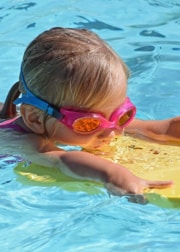Swimming Lessons For Children With Special Needs
Learning how to swim is an essential life skill that everyone should learn at a young age. Children with special needs can still learn how to swim so they can avoid drowning and other water-related accidents. Enrolling children with special needs in swimming lessons can help remove fear of going into the pool.
Swimming lessons also ensures their capability of handling themselves should they fall into a body of water. There is more to swimming than just water safety. Whether your child has a neurodevelopmental disorder or physical disability, they will highly benefit from this life-saving skill.
This blog discusses the various benefits of swimming lessons for kids with special needs.
Benefits of Swimming Classes for Special Needs Children
Swimming holds various benefits for kids with special needs and conditions. Here are some of the advantages your child will get when you enroll them in infant swimming lessons that specialize in handling these students.
Burns Excess Energy
Parents of children with ADHD can attest to how much energy their child has. Swimming is one way to redirect this energy to learning a life-saving skill. An hour in the water can burn up to 500 calories. It can tire their body quickly as it requires concentration and coordination of different parts. You can sit them down much easier so they can focus on their everyday tasks or turn in for the day.
Since physical exercise drains their energy, it can promote better sleep. Special needs kids will also have greater control over their emotions and behavior even while out of the pool once they are swimming more regularly due to lessons.
Maintains a Healthy Weight
Special needs children have a higher rate of becoming obese. Enrolling them in swimming classes will challenge them to be more active in exercising. Since swimming is a low-impact activity that engages the whole body, it is an efficient way of maintaining a healthy weight.
Provides a Sense of Calmness and Freedom
The water environment also offers a sense of freedom and calmness for children with cerebral palsy, ADHD, and autism. Water buoyancy reduces our body weight by up to 80% and offers a greater range of movements. Children with cerebral palsy complain about restricted actions on land but will love the freedom that water provides. The hydrostatic pressure from the water also reduces everyday noises that can be irritating for most children.
Apart from freedom of movement in the water, the pool is also a serene place where children with ADHD can learn how to swim calmly. You don’t let them swim on their own entirely but instead still facilitate their movement, so they remain alert. Special needs kids may even think of the swimming pool as a fun escape from their everyday living.
Moreover, children with autism will significantly benefit from the predictability and repetitive movements in the pool. Doing repeated movements can be a way for autistic children to keep their anxiety in check and concentrate better. Learning how to float in the water also helps them become more aware of their bodies while dealing with overwhelming emotions.
Improves Communication
There are various activities during baby swimming lessons, including blowing bubbles and regulating breathing underwater. These activities can help special needs children with their speech and oral articulation. Moreover, toddlers become more expressive of their emotions, whether through verbal or non-verbal communication.
Boosts their Confidence
Mastering a skill can be difficult for special needs kids. As they progress through their curriculum, the lessons become more difficult but not impossible. Failure can lead to a lack of self-esteem and may even result in not trying at all. However, learning how to swim lets your child celebrate small attainable victories. With the help of trained swimming coaches, they can perfect a stroke, stay afloat, and do a lap on their own.
Swimming also boosts the confidence of children with physical limitations. While their peers can do everyday activities alone, being disabled limits what they can do independently. Toddler swimming lessons are tailored for special needs children to help them learn and explore beyond their limits.
Moreover, your child can receive rewards for every skill they learn, giving them the confidence boost they need. With these small achievements, they can become more confident to face other challenges in life. There’s no stopping a child who believes in themselves, right?
Build Relationships with Peers
A swimming school is a great place to meet new friends and build a relationship with them. Swimming classes group your child with students of the same age and skill level to avoid feeling shy or intimidated by their peers.
Letting your child engage with other children introduces them to people outside their regular home and school life. In fact, they can also mingle with their swimming instructors and other parents. The public setting lets them be more comfortable with people outside their comfort zone.
Puts No Pressure on Students
Unlike other sports, swimming puts no pressure on passing or catching a ball to a teammate. Swimmers can compete with themselves by finishing a lap faster or swimming a farther distance than before. Enrolling in swimming lessons for kids with special needs lets them learn at their own pace with the help of a swimming coach that tracks their progress.
Enroll in Private Swimming Lessons Today
Swimming offers many benefits for every child, and kids special needs shouldn’t be left out. Provide them with the opportunity to learn this life-saving skill to reap its long-term effects. This low-impact activity goes beyond enjoyment and promotes their developmental health while boosting independence and confidence.
Find a school that offers special needs swim lessons and enroll your child today.




